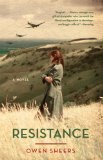Summary | Excerpt | Reading Guide | Reviews | Beyond the Book | Readalikes | Genres & Themes | Author Bio

Bad news had been filtering into the valley every day for the last few weeks.
First the failed landings in Normandy. Then the German counterattack. The pages
of the newspapers were dark with the print of the casualty lists. London was
swollen with people fleeing north from the coast. They had no phone lines this
far up, and apart from Maggie's farm, which sat higher in the valley, the whole
area was dead for radio reception. But news of the war still found its way to
them. The papers, often a couple of days old, the farrier when he came, Reverend
Davies on his fortnightly visits to The Court, all of them brought a trickle of
stories from the changing world beyond the valley. Everyone was unnerved but
Sarah knew these stories had unsettled Tom more than most. He rarely spoke of
it, but for him they threw a shadow in the shape of his brother, David. David
was three years younger than Tom. He'd had no farm of his own so he'd been
conscripted to fight. Two months ago he was declared missing in action and,
while Tom maintained an iron resolve that his brother would appear again, the
sudden shift in events had shaken his optimism.
For Sarah news of the war still seemed to have an unreal quality, even when a
few days ago the names of the battlegrounds changed from French villages to
English ones. There were marks of the conflict all about her: the patchwork of
ploughed fields down by the river once kept for grazing; the boys from her
schooldays, and the farmhands, many of them gone for years now. But unlike Tom
she didn't have a relative in the fighting. Her own older brothers had been
absent from her life ever since they'd argued with her father and broken from
the family home when she was still a girl. They'd bought a farm together outside Brecon, large enough to have saved them both from the army. So Sarah didn't
possess that vital thread connecting her to the war that brought the news
stories so vividly to life for so many others. There were women here, in the
valley, who had lost sons, and in the early years she'd seen other mourning
mothers and wives in Longtown and Llanvoy. But even these women, with their
swollen eyes and dark dresses, seemed to have passed into a different place, a
parallel world of grief. The sight of them evoked sympathy in Sarah, sometimes a
flush of silent gratitude that Tom was in a reserved occupation, but never
empathy.
Only once in the last five years had the war really impacted upon her. When the
bomber crashed up on the bluff. Then, suddenly, it had become physical. She'd
been woken by the whine of its dive followed by the terrible land-locked thunder
of its explosion. Tom held her afterwards, speaking softly into her hair, “Shh, bach, shh now.” In the morning they'd all gone up to look. Tom and she took the
ponies. When they got there the Home Guard and the police from Hereford had
already put a cordon around the wreckage so they just stood at a distance and
watched, the thin rope singing and whipping in the hilltop wind. Beyond the
crashed plane she'd glimpsed a tarpaulin laid over a shallow hump. “One of the
crew,” Tom had said with a jerk of his chin. She'd agreed with him. “Yes, must
be,” although she'd thought the hump looked too small, too short, to be the body
of a man. The ponies shifted uneasily under them, pawing the ground, tossing
their heads. They were disturbed by this sculpture of twisted metal that had
appeared on their hill, by this charred and complicated limb half embedded in
the soil as if it had erupted from the earth, not fallen from the sky. And so
was Sarah. She'd heard about the Blitz, and about Liverpool and Coventry, its
cathedral burning through the night. She'd even seen their own bombers out on
training runs. But she'd never seen an enemy plane before. Usually they were
just a distant drone to her, a long revolving hum above the clouds as they
returned from a raid on Swansea or banked for home after emptying their payloads
over Birmingham. But now, here was one of them, on the hill above her farm.
Massive and perfunctory. So ordinary in its blunt engineering. And under that
tarpaulin was a real German. A man from over there who had flown over here to
kill them.
Excerpted from Resistance by Owen Sheers Copyright © 2008 by Owen Sheers. Excerpted by permission of Nan A. Talese, a division of Random House, Inc. All rights reserved. No part of this excerpt may be reproduced or reprinted without permission in writing from the publisher.
Heaven has no rage like love to hatred turned, Nor hell a fury like a woman scorned.
Click Here to find out who said this, as well as discovering other famous literary quotes!
Your guide toexceptional books
BookBrowse seeks out and recommends the best in contemporary fiction and nonfiction—books that not only engage and entertain but also deepen our understanding of ourselves and the world around us.